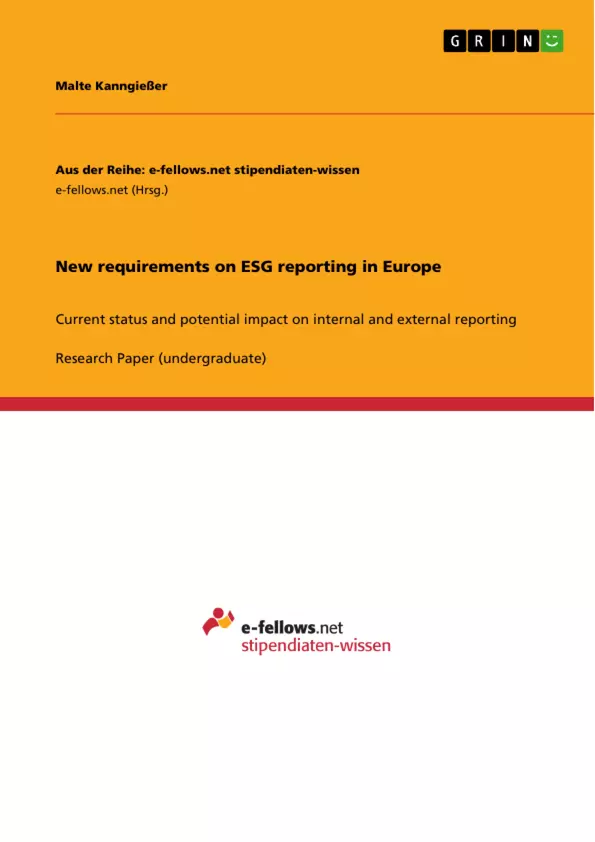Environmental, Social, and Governance (ESG) considerations are increasingly crucial in the corporate world, driven by stakeholder demands for transparency and accountability.
Europe is leading this shift with the Corporate Sustainability Reporting Directive (CSRD), which mandates comprehensive ESG disclosures. This directive marks a transition from voluntary initiatives to mandatory compliance, requiring companies to integrate sustainability into their core strategies and operations.
This study explores the current status of ESG reporting requirements in Europe and their potential impact on corporate reporting. Using a mixed-method approach, the research combines qualitative and quantitative analysis of official documents, academic studies, and industry reports. The evolution of ESG reporting in Europe began with Directive 2013/34/EU, which mandated non-financial disclosures but had limited success.
The CSRD, introduced by Directive (EU) 2022/2464, significantly expands the scope of companies required to report, aiming for nearly 75% of EU companies to comply. This expansion aligns with the European Green Deal’s vision of making Europe the first
climate-neutral continent. The CSRD mandates sustainability information in official company reports or online, ensuring transparency and accountability through 'Double Materiality'.
The CSRD impacts both internal and external reporting. Internally, companies must enhance data collection and analysis, involving management and supervisory bodies in sustainability issues. This requirement extends to the entire value chain, increasing administrative burdens and costs. Externally, transparent ESG reporting can enhance stakeholder trust, attract investments, and improve reputation, though non-compliance risks reputational damage and financial penalties.
Despite challenges, effective ESG reporting under the CSRD offers significant benefits, including improved stakeholder relations, access to capital, and opportunities for innovation and growth. The directive’s alignment with international standards like the IFRS Sustainability standards ensures consistent and credible reporting.
Inhaltsverzeichnis (Table of Contents)
- Introduction
- Research method
- Evolution and Current Status of ESG Reporting in Europe
- Potential impacts on internal and external reporting
- Conclusion and outlook
Zielsetzung und Themenschwerpunkte (Objectives and Key Themes)
This study examines the current state of ESG reporting requirements in Europe and their effects on internal and external corporate reporting. It uses a mixed-method approach, combining qualitative and quantitative analysis of official documents, academic studies, and industry reports. The research focuses on the implications of the Corporate Sustainability Reporting Directive (CSRD).
- Evolution of ESG reporting regulations in Europe.
- Impact of the CSRD on corporate reporting practices.
- Internal changes driven by enhanced ESG data collection and management.
- External implications of transparent ESG reporting on stakeholder relationships.
- Challenges and benefits of effective ESG reporting under the CSRD.
Zusammenfassung der Kapitel (Chapter Summaries)
Introduction: This chapter introduces the growing importance of ESG considerations in the corporate world and the role of Europe in implementing stringent reporting standards. It highlights the shift from voluntary to mandatory compliance with the CSRD and its impact on corporate strategies and operations.
Research method: This chapter details the mixed-method approach used in the study, focusing on the extensive literature review of official documents and research related to ESG reporting.
Evolution and Current Status of ESG Reporting in Europe: This chapter explores the historical development of ESG reporting in Europe, starting with Directive 2013/34/EU and progressing to the expanded scope of the CSRD. It emphasizes the CSRD's aim to achieve near-universal compliance amongst EU companies.
Potential impacts on internal and external reporting: This chapter analyzes the internal and external consequences of the CSRD. Internally, it discusses enhanced data collection and the integration of sustainability across the value chain. Externally, it examines the potential for improved stakeholder trust and investment attraction versus the risks of non-compliance.
Schlüsselwörter (Keywords)
ESG reporting, Corporate Sustainability Reporting Directive (CSRD), European Union (EU), sustainability, corporate social responsibility, stakeholder engagement, internal reporting, external reporting, financial reporting, non-financial reporting, double materiality, regulatory compliance.
- Arbeit zitieren
- Malte Kanngießer (Autor:in), 2024, New requirements on ESG reporting in Europe, München, GRIN Verlag, https://www.hausarbeiten.de/document/1508302


